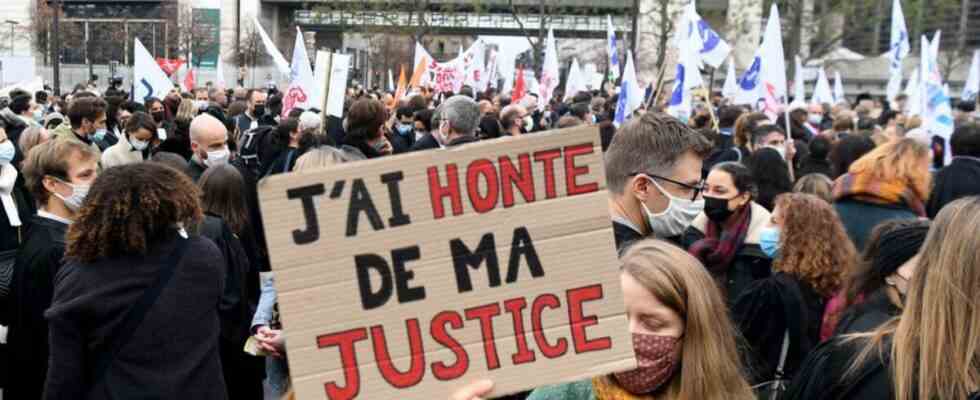Five months ago, the judiciary, usually silent, found itself in the street. An unprecedented mobilization that brought together judges, clerks and lawyers. This strike was born after the publication, on November 23, from a stand in The world in which young magistrates denounced “difficult working conditions”, a chronic lack of time, “suffering” staff and a “loss of meaning” within the profession.
These words found a considerable echo in the courts of France since the text was signed by more than 3,000 professionals out of the approximately 8,000 judges in our country (8,600 in 2019). Less than a week before the first round of the presidential election, what remains of this unprecedented mobilization in the programs presented by the candidates? 20 minutes make the point.
Consensus on membership increase
One observation seems to go beyond the traditional left-right divide: the courts are short of arms. Among the 12 official candidates, 11 propose to significantly increase the number of justice personnel. Without quantifying the increases envisaged, Anne Hidalgo (PS), Philippe Poutou (NPA), Jean Lassalle (Resistons!) and Nicolas Dupont-Aignan (Debout la France) propose “recruitment plans” for magistrates and clerks. In the event of accession to the Elysée, Marine Le Pen, she plans to “double” the number of judges.
For the seven remaining contenders who have committed to this point, the orders of magnitude vary widely. The leader of the Republicans, Valérie Pécresse, promises an “ORSEC plan” for justice with 16,000 recruitments for the next five-year term, distributed as follows: 5,000 magistrates, 3,000 clerks, 5,000 assistant lawyers and 3,000 technical staff. For his part, Jean-Luc Mélenchon pleads for the creation of 13,000 magistrate posts and 20,000 clerk posts.
Emmanuel Macron announced the hiring of “8,500 additional magistrates and justice personnel by 2027”, without giving further details. Same thing for Fabien Roussel (PCF) who announces an endowment of “25,000 magistrates, educators for justice” but also support for minors. Finally, opposed on the political spectrum, the ecologist Yannick Jadot and Eric Zemmour have both quantified the needs for 3,000 new magistrates.
Measures deemed “unrealistic”
But how do you analyze these figures in relation to the needs expressed by justice personnel during the strike this fall? In a letter sent to all candidates, the Union of Judges (USM) put the current workforce into perspective with those of our European neighbors. According to a report published in October 2020 by the European Commission for the Efficiency of Justice (CEPEJ), France had three prosecutors per 100,000 inhabitants when the European average was eleven magistrates for example. More reasonable than some candidates, the majority union within the profession pleads instead for a programming law allowing the recruitment of 500 magistrates and 1,000 clerks per year, for the next five years, or 7,500 staff.
Contacted by 20 minutes, the secretary general of the USM, Céline Parisot denounces a “war of numbers” between candidates: “We are witnessing real auctions and it is who will offer the most jobs. But you have to be realistic. If we want to maintain a good level of recruitment, with properly trained magistrates, we cannot exceed a certain threshold”. The proposal of the current Head of State particularly questions the unions. “A President who promises to recruit 8,500 justice personnel when he has been governing for five years leaves us doubtful. Perhaps there is a collective awareness of our lack of resources, but will this be followed by action? “Asks Kim Reuflet, head of the Syndicate of the judiciary (SM).
A budget that remains unclear
Beyond recruitment, trade unions regret the lack of details on the budget allocated to judicial services. “Our IT resources are poor. Our software is not updated at the rate of the reforms that are passed by Parliament,” continues Kim Reuflet. Another point raised by the USM: the evolution of the judicial real estate stock. “One of the major difficulties, it’s the lack of courtrooms available in certain jurisdictions”, observes Céline Parisot.
Thus, only two candidates have so far positioned themselves in favor of an increase in the budget allocated to justice. Yannick Jadot (EELV) is committed to releasing an additional one billion euros by 2027 but explains that these funds will finance the recruitment of personnel. Ditto for Valérie Pécresse who wishes to increase by more than 50% over five years the means of the courts to bring them to nine billion per year. But neither of them indicate, in detail, how these sums will be distributed. There are now a few hours left for the candidates to do so.

